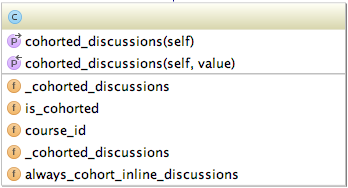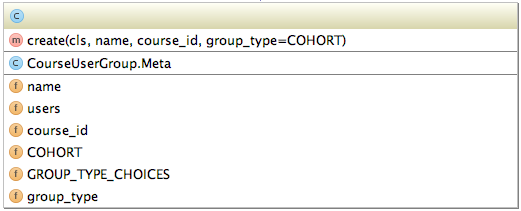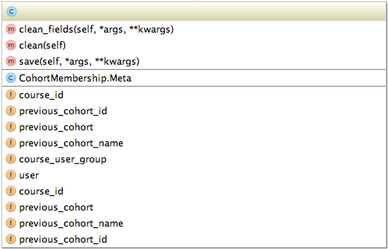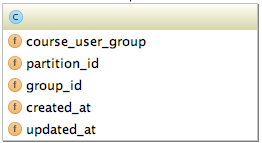Cohorts and Content Groups
Where are Cohorts and Content Groups Stored?
Content Groups
Content Groups are a type of UserPartition, and they are defined in a UserPartitionList that is stored on the course module itself (in mongo) via the InheritanceMixin in inheritance.py:
# This is should be scoped to content, but since it's defined in the policy
# file, it is currently scoped to settings.
user_partitions = UserPartitionList(
display_name=_("Group Configurations"),
help=_("Enter the configurations that govern how students are grouped together."),
default=[],
scope=Scope.settings
)
Each UserPartition has a scheme associated with it; the currently defined schemes are "cohort" (for content groups) and "random" (for A/B tests).
Also defined in the InheritanceMixin is group_access, which specifies which UserPartition/group combinations have visibility to the XBlock. The keys are UserPartition ids, and the values are lists of Group ids.
group_access = Dict(
help=_("Enter the ids for the content groups this problem belongs to."),
scope=Scope.settings,
)
In practice, group_access looks like
{partition.id: [partition.groups[0].id, partition.groups[2].id]}Cohorts
There is a legacy cohort_config dict defined in CourseFields (see below), which is used for migration only to the new model representation.
cohort_config = Dict(
display_name=_("Cohort Configuration"),
help=_(
"Enter policy keys and values to enable the cohort feature, define automated student assignment to "
"groups, or identify any course-wide discussion topics as private to cohort members."
),
scope=Scope.settings
)
The package openedx/course/djangoapps/course_groups contains the majority of the cohort code. The models.py class contains the following SQL models:
CourseCohortsSettings
The new class-specific cohort configuration model.
CourseUserGroup
The model representing groups of users in a course. The only defined group type is "cohort".
CohortMembership
An internal model used to enforce that a learner can be in only one cohort per course.
CourseUserGroupPartitionGroup
The model that maps together the linking between a single CourseUserGroup and a single UserPartition/group_id combination. In other words, this model stores the linking of a cohort to a single content group.
CourseCohort
A model that stores information about a specific CourseUserGroup. All it currently stores is the assignment type, which is either "random" or "manual".
CohortPartitionScheme
This is not a model, but instead the scheme that uses CourseUserGroup/CohortMembership and CourseUserGroupPartitionGroup to map learners into content groups. It implements a single method, get_group_for_user, which does roughly the following:
- Checks masquerading to see if the learner is really a staff member masquerading as a member of a content group. If so, returns that value.
- Gets the cohort assignment for the user/course key combination (CohortMembership).
- Gets the UserPartition/group_id combination associated with that cohort (CourseUserGroupPartitionGroup).
- Returns the group associated with the UserPartition/group_id combination.
Automatic Cohorting of Verified Track Learners
The code for this lives in lms/djangoapps/verified_track_content. This includes the admin configuration model, VerifiedTrackCohortedCourse, and the celery task that moves learners into the correct cohort upon enrollment changes. The celery task is kicked off from a post_save signal from the CourseEnrollment model (which is defined in common/djangoapps/student/models.py).
Links
Current Documentation and Best Practices
- Verified Cohorts Practices
- Partner Doc: Creating Cohort-Specific Course Content (Published)
- Partner Doc: Differentiated Content for Verified Track Learners (Draft - pilot only)
- Cohort questions and practices (Content Experiments vs. Learner Cohorts)
Proposed Features
- Automatic track-based cohorting – Project Page /wiki/spaces/EDUCATOR/pages/120881208
- Content Differentiation for Enterprise Learners
Older Architecture Diagrams and Proposals
- /wiki/spaces/TNL/pages/64061783 (notes capturing discussions about generalizing track-specific content)
- /wiki/spaces/TNL/pages/63406221
- /wiki/spaces/PT/pages/18350129
- /wiki/spaces/PT/pages/11927648




